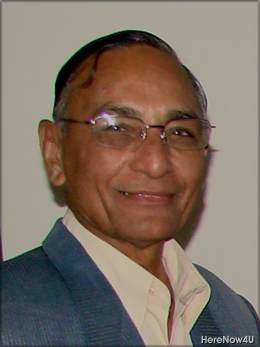

World Congress of Philosophy “Rethinking Philosophy Today”, Seoul, South Korea, July 30 to August 5, 2008
International Roundtable: 'The Role of Jainism in Evolving a New Paradigm of Philosophy'

JAIN VISHVA BHARATI UNIVERSITY
New Model For Scientific And Technological Policies In Jain Perspective
We, women and men, have gathered here from all over the world, to participate in the XXII World Philosophical Congress to find a way of establishing a peaceful co-existence through intercultural dialogue. The subject for discussion before us is "Rethinking Philosophy Today". Why? What has happened suddenly to the great traditions of philosophies of east and west which have guided the humanity for many centuries? The reason seems to be evident. It is believed that in the field of philosophy the year 2000 is the end of the 400years of the modern era. The 21st century is the start of a post-modern era in which the old coordinates of control need a new paradigm. To me, there seems to be two great challenges before us.
The first is to find something to say on the subject of peace and peaceful co-existence without merely rehearsing familiar, banal platitude! Everybody talks of peace but of his own brand. Many a times, the super political powers, the super religious powers, have made efforts and taken interest in the creation of peace and happiness but we faced the dreadful paradox at the end i.e. talking peace but making conflict or war.
The second more pressing challenge is to develop intercultural dialogue amongst the existing different faiths and philosophies that basically differ in their principles. A belief is based on selfishness and the concern for personal gain as a result of which one disregards the good or gain of others. Concentration on a caste or a sect is rooted in individual beliefs. The same responsible for the growth of conflict, disputes and wars. Such faiths have lost sheen and leadership in the awakening of the new civilizations which are evolved due to advancement of modern science and technology.
Further, the globalization has added fuel to the fire. Now the humanity at large is in need of a global ethics of mutuality and interdependence. In human history, we find first time that a new man is striving to be born; a new consciousness is knocking at the door. In all corners of the world one hears a common voice of people visualizing a new man, a new society and a new world. The new generation understands that the binding force of humanity is science and technology and not the philosophy. “Join those you can't beat” - an old adage!
Hence, rethinking on philosophy has become necessary today. The above-mentioned two challenges seem to be contradictory but are actually complementary to each other. Hence they should be dealt with accordingly.
Firstly, we have to choose a philosophy which can provide a non-violent, peaceful and stable social order in the face of scientific and economic challenges. Jain Acharya Mahapragya suggests, "we should first try to know the new reasons of violence because they have changed over a period. Economic development and surfeit of consumer goods do not reduce violence and crime. On the contrary, they are instrumental in increasing them. The future of humanity lies in a balanced development of labour, wealth and self-restrain [1]." Our rethinking should be, therefore based on the means and methods to tackle the ever-deepening problem of violence all over the world. There is a necessity to transfer the attention, on the part of philosophy, from purely abstract problems related to soul, god and consciousness to the questions related to the material world, which can help in peaceful living. In order to achieve this, the philosophy itself needs shift - from culture to future. It needs to depart from traditions in order to create its own trends.
However, we find that if science and technology have opened up new frontiers of unprecedented human progress, they have also brought mankind to the threshold of total anarchy [2]. The world plunges deeper and deeper into one crisis after another, there is the almost complete rupture of human values, moral degeneration and different types of deprivations leading to tensions and sufferings. It is being increasingly felt by the sensitive philosophers that a certain ethical and cultural atmosphere is essential for the proper functioning of science. Science today has perhaps begun to cross the borders of morals and ethics. If it gets divorced completely from the realm of morality and ethics then the power it possesses may be used for evil purpose. If it ties itself to the gospel of hatred and violence, undoubtedly it will have taken a wrong direction which will bring much peril to the world.
Secondly, a large number of people are poverty stricken in this world. The basic question is how can one contain and curb the pernicious impact of the future of over-consumerism? For, consumerism is the result of industrialization and the industrialization is the result of application of tools and techniques of science. As the science and technology are simply the motor of modernization, the philosophy alone has the capacity to take lead and hold the key to developing both - a better human being and a better society.
It is necessary to explore the potentialities of relevance and critical perspectives of classical philosophical systems for the epistemology and ethics of modern scientific thought. A classical system of thought like that of Jainism may be helpful. It has two-fold relevance for the scientific thought.
- Philosophy of Science
- Sociology of Science
1. Philosophy of Science
One area of relevance is the formal and methodological level of philosophy of science. The logical analyses and techniques of the Jain philosophical tradition i.e. Anekant may have important bearing that leads to the formal studies of the conceptual and methodological frame work of science. To me, the Anekant philosophy of Jainism which has remained in oblivion can be helpful to us. Anekant philosophy predicts that there are infinite ways to describe even the simplest of the subject or incidence because the existence is multi dimensional. For determining the substance one should use the absolute viewpoint, for determining relations one should use the non-absolute viewpoint.
When there was a deadlock between the philosophies of "concept of permanence of Vedanta" and "concept of impermanence of Buddhism", Anekant solved the crisis by proposing the “concept of permanence cum transience”. It emphasizes that the permanent and the impermanent both co-exist. This philosophy finds semblance in the scientific theories of relativity and uncertainty. Hallmarks of Anekant [3] philosophy are
- Acceptance of truth having multiple facets,
- Partial perception of truth due to limitations of the observer,
- Incomplete description of truth due to limitations of expression and
- Recognizing the equal possibility of different viewpoints to be true
These four postulates sum up the attitude of Jain Anekantvad. A very important and powerful corollary of Anekant principle is that it leaves vast space for various view points to be true, while one philosophy may be partially true, others too have equal if not more chance of being true. It is like two persons standing on different radii of same circle and traveling towards center.
Both are traveling the entirely different paths but arrive at the same destination. This all-encompassing thought is the need of the hour to start with the intercultural dialogue.
2. Sociology of Science
The Sociology of science centers on a new image of science which we may now term as critical science, an image that contrasts the other images of science viz., the Heroic image of science as the product of individual creativity and the organizational image of science as a product of a technocratic order. As against these images of science we will have to develop a new perspective of critical science which would place science in its ecological context of human adaptation. This new perspective would require a re-thinking about the moral and cultural precondition of scientific activity. While considering the new paradigm of philosophy Jain perspective suggests a new model for scientific and technological policies as follows-
- Concern for Ecology
Science is not only essential for the development: it is indispensable for the sustained development. The primary requirement is a new world order which ensures durable peace and reliable security against the backdrop of sustainable development, that is. development which is sensitise to environmental conservation.
The idea of ecology of science is firmly grounded into a moral perspective and the Jain moral tradition of the respect for life and its sanctity may have high potentials of relevance. The Jain doctrine proposes that life exists in organic masses, in stones, in lumps of earth, in drops of water, in the flames of fire, in the wind and in the vegetation too [4]. So, the Jain doctrine strongly advocates that people belonging to all nationalities must refrain from destroying them.
- Concern for Poor
It should be an abiding corrective for every scientist who regards science as an end in itself that the objective of science can only be the service of human kind. It must be placed at the service of the depressed and the deprived. The most important principle of Jainism is to live together peacefully i.e. “'parsapgraho jeevanam” [5].
Scientific policies should add new dimensions in the frontier areas of atomic energy, space research, oceanic development, etc. to place input in agriculture, drinking water flood and drought management. This will improve the lives of persons who are really backward and deserving.
- Holistic Approach
Abjuring the narrow compartmentalization into which scientific study so often falls, an effort should be made for a holistic approach to science. This can be done by fusion of philosophy and science. Acharya Mahapragya says, “It should cause no surprise that the laws being investigated by the scientists were investigated by the ancient metaphysicians too. Science and Philosophy should not be thought as altogether unrelated.”
It is very essential to integrate science with philosophy and vice-versa. The material, the mechanical and the electromagnetic universe is three-dimensional. An attempt to bind electromagnetic world with a higher dimension of consciousness will help in the emergence of neo-philosophy.
- Positive Scientific Temper
Through education, positive scientific temper should be generated right from the childhood. It will help in making both a better human being and a better society. We have seen over the years that every technology has constructive as well as destructive applications. Let us learn to make use of technology for peaceful purposes only. Unfortunately, large segments of the world scientific community remain mobilized in the cause of war. Third generation nuclear weapons are promoting the illusion of a winnable nuclear war. The scientific community has to be persuaded to stop playing soldier, even as governments are persuaded to stop using scientist as pawns in the games of war. It also links nuclear disarmament with the reduction of conventional forces and armaments to minimum levels for defensive purposes only [6].
In Jain perspective, the emphasis has been given on the non-violent and impartial deed and action i.e. the conduct which does not involve any anger and ego. This is the highest good and through this one can reach to a level of total good i.e. emancipation or liberation.
- Sustainable Development
The first relationship between science and philosophy was forged on man's exploration of nature. In a process of exploring the nature, the natural resources should not be unduly exhausted, because they are not unlimited. Humanity needs development but science should advance to an extent of sustainable development.
In Jain perspective every individual has a right to live. Hoarding of the material product is a sin. There should be a fair distribution of the wealth and the products obtained through scientific growth. This can be possible only if the person holds restrains on his unduly increasing ambitions. Acharya Mahapragya says, “A mentally steady life is impossible to conceive if education or training is not based on the balanced development of labour, wealth and self-restraint.”
- Gender and Cast Equality and Theory of Copposites
In Jainism, there is only “Purush” - human - and “Purusharth” - human dexterity. There is no gender or caste bias nor is there any apartheid. All humans are at par as far as their soul and karmic manifestations are concerned. Males and females all have equal capacity and opportunity to undertake the practices of salvation. Jains believe that normally the opposites are not adversaries rather they are complementary and essential for the very existence of one another. This theory of “copposites” has helped women enjoy an equal and respectable status within the Jain community. The success can now be emulated at the larger canvas of the world humanity. The science and technology of today can be guided by this beacon of light.
Historically, the man had been calling the shots because most of the activities in the pre-industrialized period were physically demanding where men easily outclassed the women. The male domination and chauvinism thus became the way of most communities. But with the strengthening of scientific innovations, there is hardly any place for discrimination. While it might be difficult to plough bulls it not difficult to maneuver a tractor, it may be physically taxing to ride a horse but not a car. If the tasks are to operate a gun, use a computer or to fly a plane, there is hardly any need for gender prejudice. So, the actual women empowerment starts with equipping them with technology. With more and more involvement of women in decision-making, the snowballing good effects will automatically accrue.
- God as Pristine Soul and not the Creator, Perpetuator and Destructor
Another aspect of Jainism which can help mitigate worldwide hatred and religious fundamentalism is its concept of God.Transcending theologies and denominations, there is a conviction in a creator divinity which is believed to spawn the universe and is present throughout, upholding and administering the universe. People have always accepted god will never be revealed to us empirically. Yet for eons we have deemed this entity worthy of adoration and have directed our ardent prayers to it, making it the vessel of our hope.
We shall see that the Jain view point is quite different and is very close to the scientific facts and findings.
Jainism postulates that a soul can transcend to achieve its pristine form and thereby can be christened as God but it does not acquire any jurisdiction on the fate of universe and humans. Science and Jainism, both are on firm footing when they do not believe god is creator, perpetuator and destructor. Einstein once asked the question, “How much choice did God have in constructing universe?”
A time has come when science and Jainism should popularize the concept of human self-responsibility and dexterity than to depend on god.
If we deeply analyze the psychology behind the crime and corruption, in my assumption, somewhere in our subconscious mind lays a fact that the God Almighty will be compassionate enough to forgive my sins and will take care of me as parents forgive the mistakes of a child. If this mind set is replaced by the “self-responsibility”, the crime rate may drastically come down. No body to rescue and you have to pay dearly for your crimes - this revelation may deter the moral offenders.
“Aatma hee karta hai - Aatma hee bhokta hai”
This sense of “self-responsibility” will also take care of religious fundamentalism. World has seen the most heinous crimes being executed in the name of God. Once God is dispended with, the very idea is extremely thrilling and is full of good promises, a new world order will emerge based on individual and collective responsibility of the human race.To sum up